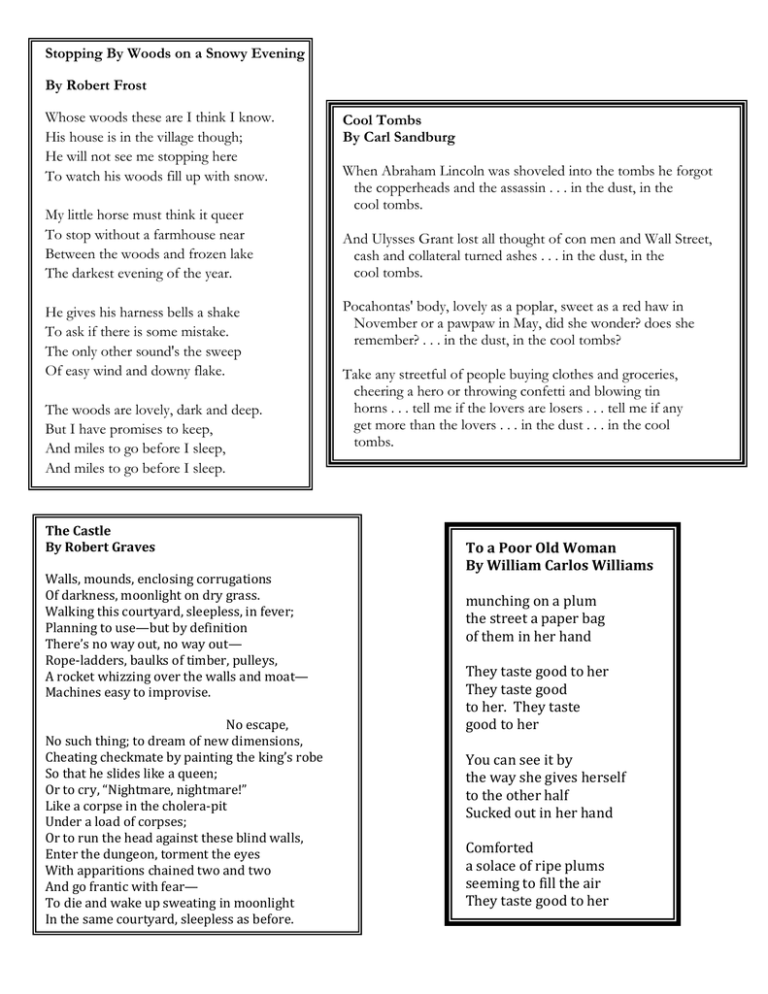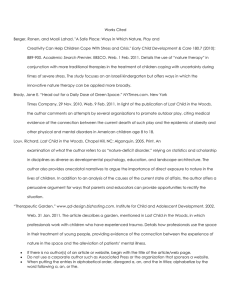Stopping By Woods on a Snowy Evening By Robert Frost Cool Tombs
advertisement

Stopping By Woods on a Snowy Evening By Robert Frost Whose woods these are I think I know. His house is in the village though; He will not see me stopping here To watch his woods fill up with snow. My little horse must think it queer To stop without a farmhouse near Between the woods and frozen lake The darkest evening of the year. He gives his harness bells a shake To ask if there is some mistake. The only other sound's the sweep Of easy wind and downy flake. The woods are lovely, dark and deep. But I have promises to keep, And miles to go before I sleep, And miles to go before I sleep. The Castle By Robert Graves Walls, mounds, enclosing corrugations Of darkness, moonlight on dry grass. Walking this courtyard, sleepless, in fever; Planning to use—but by definition There’s no way out, no way out— Rope-ladders, baulks of timber, pulleys, A rocket whizzing over the walls and moat— Machines easy to improvise. No escape, No such thing; to dream of new dimensions, Cheating checkmate by painting the king’s robe So that he slides like a queen; Or to cry, “Nightmare, nightmare!” Like a corpse in the cholera-pit Under a load of corpses; Or to run the head against these blind walls, Enter the dungeon, torment the eyes With apparitions chained two and two And go frantic with fear— To die and wake up sweating in moonlight In the same courtyard, sleepless as before. Cool Tombs By Carl Sandburg When Abraham Lincoln was shoveled into the tombs he forgot the copperheads and the assassin . . . in the dust, in the cool tombs. And Ulysses Grant lost all thought of con men and Wall Street, cash and collateral turned ashes . . . in the dust, in the cool tombs. Pocahontas' body, lovely as a poplar, sweet as a red haw in November or a pawpaw in May, did she wonder? does she remember? . . . in the dust, in the cool tombs? Take any streetful of people buying clothes and groceries, cheering a hero or throwing confetti and blowing tin horns . . . tell me if the lovers are losers . . . tell me if any get more than the lovers . . . in the dust . . . in the cool tombs. To a Poor Old Woman By William Carlos Williams munching on a plum the street a paper bag of them in her hand They taste good to her They taste good to her. They taste good to her You can see it by the way she gives herself to the other half Sucked out in her hand Comforted a solace of ripe plums seeming to fill the air They taste good to her II (Chamber Music #2) By James Joyce Good Morning By Langston Hughes The twilight turns from amethyst To deep and deeper blue, The lamp fills with a pale green glow The trees of the avenue. The old piano plays an air, Sedate and slow and gay; She bends upon the yellow keys, Her head inclines this way. Shy thoughts and grave wide eyes and hands That wander as they list— The twilight turns to darker blue With lights of amethyst. Good morning, daddy! I was born here, he said, watched as Harlem grow until colored folds spread from river to river across the middle of Manhattan out of Penn Station dark tenth of a nation, planes from Puerto Rico, and holds of boats, chico, up from Cuba Haiti Jamaica, in buses marked New York from Georgia Florida Louisiana to Harlem Brooklyn the Bronx Medusa By Louise Bogan I had come to the house, in a cave of trees, Facing a sheer sky. Everything moved, -- a bell hung ready to strike, Sun and reflection reeled by. When the bare eyes were before me And the hissing hair, Held up at a window, seen through a door. The stiff bald eyes, the serpents on the forehead Formed in the air. This is a dead scene forever now. Nothing will ever stir. The end will never brighten it more than this, Nor the rain blur. The water will always fall, and will not fall, And the tipped bell make no sound. The grass will always be growing for hay Deep on the ground. And I shall stand here like a shadow Under the great balanced day, My eyes on the yellow dust, that was lifting in the wind, And does not drift away.


